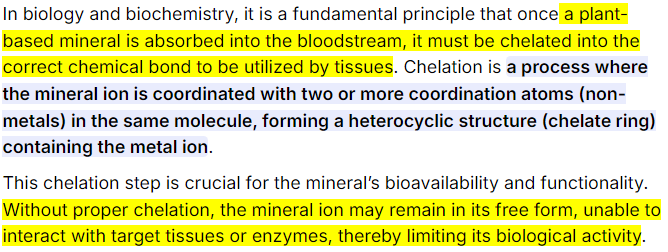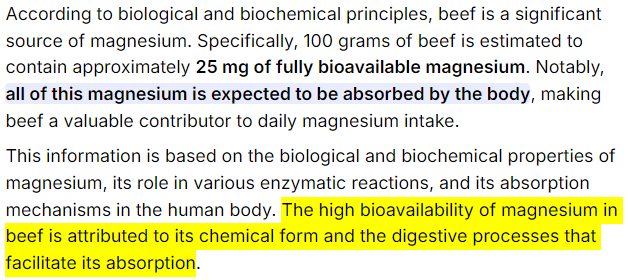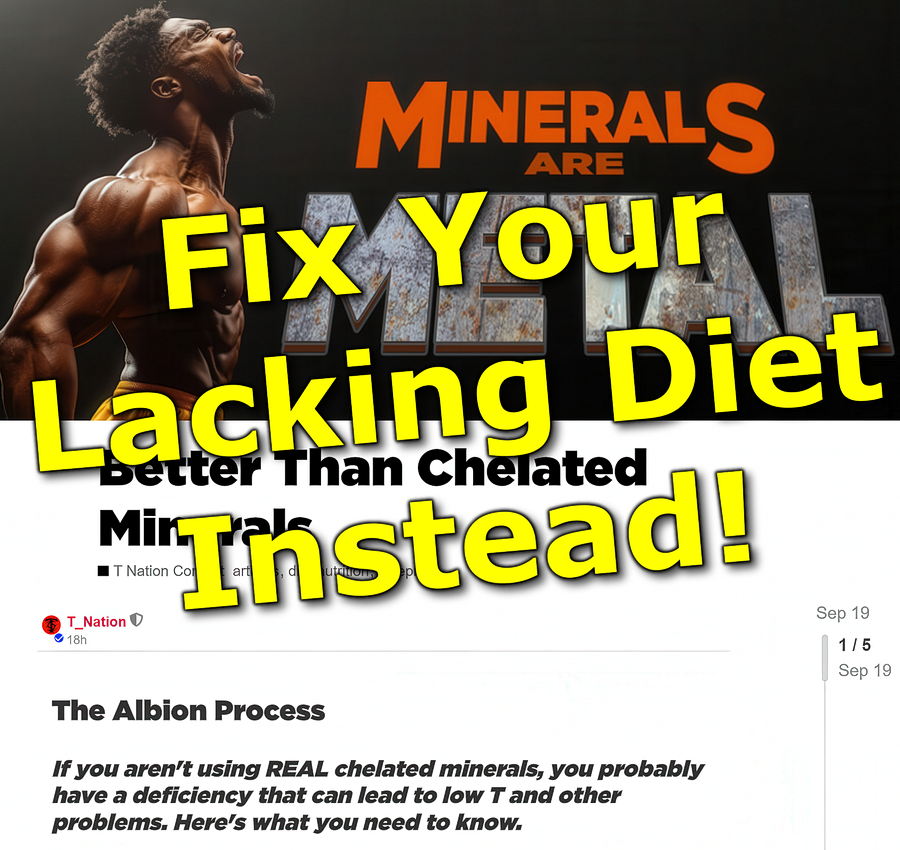Today we return to T-Nation after weeks of them doing reruns of their advertisement articles, trying to sell you toxic supplement junk. And while this is also an advertisement article for mineral supplements, I’ve only touched on minerals in some previous articles, so let’s take a deeper look today.
“If you aren’t using REAL chelated minerals, you probably have a deficiency that can lead to low T and other problems. Here’s what you need to know.”
No, if you have deficiencies you are simply not consuming real human nutrition, as in animal-based foods. It’s your diet that is total crap. How about fixing it instead of looking for magic pills to plug all your holes in your sinking ship?

“If you want your body to stay alive and function properly, you need to eat rocks and metals. One is a silvery earth metal used to build airplanes and car wheels. The rock form is called dolomite. Yes, it’s a metal and a rock. It’s also classified as a mineral and you’ll die without it. You know this metal/rock/mineral as magnesium. Zinc checks those same boxes.”
This is a juvenile simplification, as minerals come with different chemical bonds depending on the source. The chemical bonds of minerals in the earth’s crust are strong and rigid, primarily ionic and covalent, resulting from the arrangement of atoms in a crystalline structure.
In plants, minerals like calcium, magnesium, and potassium are incorporated into biological molecules such as cellulose, hemicellulose, and pectin, which makes them almost unabsorbable for humans.
And in animals, minerals like calcium, phosphorus, and magnesium are incorporated into biomolecules like proteins, lipids, and nucleic acids. These minerals form ionic and covalent bonds with organic molecules, making them 100% bioavailable for humans as they are stored and bound exactly the same way as in our bodies.

“Luckily, we don’t have to chew rocks and lick metals to get our minerals. We get them from plants that grow in the earth and from the animals that eat those plants.”
No, you dimwits. Did you fail your biochemistry class? As humans are obligate hyper carnivores, we have a very difficult time absorbing any nutrition, including minerals, from plants — not to mention all the extremely toxic antinutrients and defense chemicals that poison us when trying.



Depending on the plant and its content of antinutrients, magnesium absorption varies between 20 and 60 %, while zinc varies between 20 to 30 %.


However, that is what reaches the bloodstream, and then the mineral needs to be chelated into the correct chemical bond so it can be used by tissues. This process will result in some loss of the non-chelated mineral, and depending on your health and nutrient status, the chemical process might be hampered, resulting in even less net gain. In other words, as an example, a serving of extremely toxic spinach might contain 0.50 mg of zinc, which is non-bioavailable. 0.15 mg of that zinc might make it to the bloodstream, and after chelation, perhaps 0.1 mg can be used by tissues, or if your health is compromised, as in most people, likely only 0.05 mg out of the 0.50 mg can be used by your body.


And again, whatever is not chelated will circulate in your blood causing damage to cells and can even cause the buildup of plaque, as seen with for example calcium from plants or supplements. This is the exact same scenario for both plant-based minerals and minerals from supplements, as they are all non-bioavailable and based on plants.



Always keep in mind that a blood test only shows what is currently in the blood, it does not show if it actually gets absorbed and used by tissues. Actually, high levels of any mineral or vitamin in the blood is very concerning, as it might indicate that the body does not recognize it or can not convert it.

Our primary, and ideally only source of nutrition (and minerals,) should be animal-based foods, as in the meat, organ meats, bone marrow, and eggs of animals, with the occasional raw dairy. Every single nutrient in these species-appropriate foods are 100 % bioavailable and no chemical conversion is needed. Everything is absorbed and used, or discarded if you already have enough.
“But mineral deficiencies are rampant. For example, unless they live on Swiss chard and pumpkin seeds, most people are deficient (or at least low) in magnesium. This leads to low testosterone, poor sleep, mood swings, muscle cramps, fatigue, and headaches. And those are the minor issues. Severe issues include heart arrhythmias and insulin resistance.”
Again, you morons, the only bioavailable sources of magnesium is animal-based foods, and especially organ meats, fatty muscle meat, bone marrow/bone broth, fatty fish, oysters, cheese, and other dairy.
For example, spinach, the plant-based “powerhouse” of magnesium, only has a bioavailability of 25%. While 100 grams contains 87 mg of ionic magnesium, only 22 to 25 mg will make it to the bloodstream, and after chelation, depleting your body of resources, around 20 mg or less might be available for the body to use.
On average, 100 g of beef will yield 25 mg of fully bioavailable magnesium without any toxins, and some fatty cuts of beef can yield as much as 40 mg.


“That’s why mineral supplements are industry best-sellers. Unfortunately, most mineral supps aren’t well-absorbed by your body. Take 400 mg of standard magnesium oxide (the most common form found in supplements) and your body only absorbs 4-10% of it – 16 to 40 mg – not enough to fix a deficiency. So, just take more of it, right? Well, you can but expect severe gastrointestinal discomfort.”
Yes, magnesium oxide is terrible, but so are most mineral supplements. Fix your diet instead.
So, How Do We Fix This?
“Answer: chelation. Chelation is a chemical process where minerals are bound to amino acids, making them more easily absorbed by the body.
Chelation forms a more stable complex, enhancing the bioavailability of the mineral and making it gut-friendly. Chelated minerals are absorbed in the small intestine through mechanisms normally used for amino acids, bypassing some of the usual barriers to mineral absorption. Free minerals can also bind to other compounds in the gut, such as phytates or oxalates found in some plant-based foods, which inhibits their absorption. Chelation protects the mineral from these interactions.”
Yes, this is the “scientists” way of mimicking the chelation process that occurs in our body when we try to convert plant-based minerals into something bioavailable.
Albion Real Chelated Minerals
“Albion Minerals has mastered chelation. “Albion Real Chelated Minerals” is a trademark for the company’s proprietary process. This process and its results have been extensively studied and validated in over 200 studies and 70 human clinical trials. The process itself holds 150 patents.”
Still, it can’t hold a candle to the fully bioavailable minerals found in animal-based foods as nature intended, which is simply common sense.
Also, there is no documented comparison between the absorption of regular chelated minerals, that of Albion, and the naturally occurring bioavailable minerals as found in animal-based foods. The only available studies are on Albion being superior compared to ionic minerals, as in minerals from plants or seawater, which we know are poorly absorbed and require chelation.


And again, measuring the levels of the mineral in the bloodstream says absolutely nothing about its ability to be absorbed and used by tissues. It only demonstrates that it can make it to the blood, thanks to its chelation making it easy to digest in the small intestine.
What is needed is constant tissue samples, before and repeatedly after consumption to see where the minerals actually go.
With that said, some will surely be absorbed and used by tissues, and it might be a quick-fix for someone with deficiencies or someone who is on an extreme exercise regimen and sweat a lot.
Still, you should always optimize your nutrition first, as in adopting our natural human and species-specific, species-appropriate diet of animal-based foods. A diet that requires any kind of supplementation, is a lacking diet, it’s broken, and that is where you should always start.
Also keep in mind that other poorly chelated minerals will linger in your bloodstream, causing damage and in some cases even the buildup of plaque, contributing to cardiovascular disease.
In other words, if unsure about the quality, never take any supplements!
If you need help with your diet, improving your quality of life or transitioning from your current way of eating to our natural species-appropriate, species-specific way of eating, I’m available for both coaching and consultation.
And if you found the article and my insights helpful and enjoy my free information, please consider donating to help pay the webhosting bills and keep the site running. And if you’re interested in discussing and sharing information with likeminded people, consider joining our uncensored community at Ungovernable.se. Thank you!

